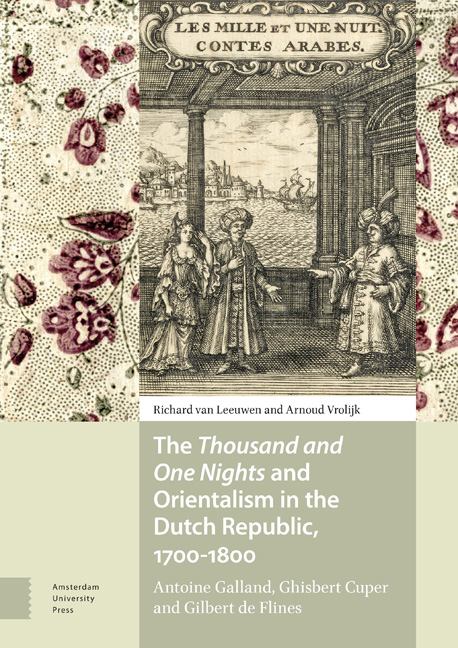 Thousand and One Nights and Orientalism in the Dutch Republic, 1700–1800
Thousand and One Nights and Orientalism in the Dutch Republic, 1700–1800 Book contents
- Frontmatter
- Contents
- Introduction
- 1 The Thousand and one nights and literary Orientalism in Europe
- 2 Dutch Orientalism before 1700
- 3 Antoine Galland and Ghisbert Cuper
- 4 The early editions of the Nights
- 5 Gilbert de Flines
- 6 Later editions in the eighteenth century
- 7 Dutch Orientalism in the eighteenth century
- Conclusion
- Appendix 1 Bibliographic survey of Dutch editions, 1705-1807
- Appendix 2 The David Coster engravings
- Appendix 3 Text samples of the Dutch Nights
- Appendix 4 French and Dutch quotations
- Illustration credits
- Bibliography
- Index
Introduction
Published online by Cambridge University Press: 21 November 2020
- Frontmatter
- Contents
- Introduction
- 1 The Thousand and one nights and literary Orientalism in Europe
- 2 Dutch Orientalism before 1700
- 3 Antoine Galland and Ghisbert Cuper
- 4 The early editions of the Nights
- 5 Gilbert de Flines
- 6 Later editions in the eighteenth century
- 7 Dutch Orientalism in the eighteenth century
- Conclusion
- Appendix 1 Bibliographic survey of Dutch editions, 1705-1807
- Appendix 2 The David Coster engravings
- Appendix 3 Text samples of the Dutch Nights
- Appendix 4 French and Dutch quotations
- Illustration credits
- Bibliography
- Index
Summary
In the seventeenth and eighteenth centuries, Orientalism was in vogue in various forms in Western Europe. This trend of cultural exoticism had been triggered by Europe's increased interaction with Oriental societies – from the unfamiliar empires of China, Japan and Mughal India to the more conversant Muslim realms of Persia and the Ottomans. Following in the tracks of explorers and traders, European scholars and diplomats sought to solidify relationships with these foreign regions and to enhance their knowledge of non-European languages and cultures. The Portuguese, Dutch and English trading companies were not only instruments for exploiting new economic opportunities in the East; they were also carriers of commodities and ideas that changed fashions, tastes and intellectual debates in Europe. In the course of two centuries, Europe's encounter with the Orient decisively transformed the direction of European intellectual and cultural history, providing new visions of the world and of Europe's place in human civilisation.
This new taste for the Orient can also be perceived in the field of literature. Although Orientalism had been an important element in European literature from the Middle Ages onwards, it was in the eighteenth century in particular that references to the Orient became more prominent and structurally incorporated. This was the century of the so-called Oriental tale, the type of short story set in the Arab world or the more distant East and usually marked by a distinct, exotic ambience. The taste for Orientalism was, of course, partly aroused by the growing communication between Europe and the Orient and by Europe's keen interest in travel accounts and information concerning Eastern societies. It was also stimulated, however, by what is commonly considered to be one of the greatest literary events of the period: the appearance of the first European translation of the Thousand and one nights. The French Orientalist Antoine Galland's version of the Arabic collection of tales was published in twelve volumes between 1704 and 1717. The work, entitled Mille et une nuit, became an instant success; it gained a wide readership in France and was soon re-translated into all the main European languages. It is no exaggeration to say that Galland's version of the Thousand and one nights not only established a European ‘tradition’ of the Nights but also significantly contributed to the shaping of the literary landscape in Europe in the eighteenth century.
- Type
- Chapter
- Information
- Thousand and One Nights and Orientalism in the Dutch Republic, 1700–1800Antoine Galland, Ghisbert Cuper and Gilbert de Flines, pp. 9 - 12Publisher: Amsterdam University PressPrint publication year: 2019


